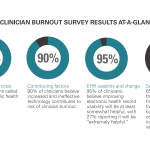New Spok Survey Reveals Most Clinicians Believe Technology and Workload are the Top Contributors to Clinician Burnout

The No. 1 obstacle to seeking help for symptoms of burnout is lack of institutional attention and resources
SPRINGFIELD, Va.–(BUSINESS WIRE)–Spok, Inc., a wholly owned subsidiary of Spok Holdings, Inc. (NASDAQ: SPOK) and a global leader in healthcare communications, announced new findings regarding clinician burnout. More than 470 clinical staff at U.S. hospitals and health systems responded to the Spok-administered survey, which measures clinician perception of burnout. The survey also sought to identify if organizations are implementing solutions proposed in the 2019 paper: A Crisis in Healthcare: A Call to Action on Physician Burnout. Key findings confirm that clinicians think burnout is a “public health crisis,” yet many report their organizations are not implementing recommended strategies to address it.
When asked whether increased or ineffective technology contributes to the risk of clinician burnout, the vast majority (90% of all respondents) strongly or moderately agreed. And 89% of respondents said burdensome or increased workload (not related to direct patient care) is the biggest factor that contributes to this risk.
Despite these concerns, when asked what prevents clinicians from seeking help for potential symptoms of burnout, the No. 1 obstacle cited by respondents (65%) was that their organization lacks institutional attention and resources. When asked how often their organization leaders discuss burnout, 47% said rarely or never.
“Clinician burnout is a complicated issue. The phrase is often used to capture associated symptoms like occupational stress, depression, moral injury, and many other terms,” explains Teresa Niblett, RN-BC, director of clinical informatics at Peninsula Regional Medical Center and member of the Spok nursing advisory council. “The pursuit of the triple aim—improving care experiences, bettering the health of populations, and reducing the costs of healthcare—results in many variables that increase pressures on healthcare workers. I am not surprised 92% of clinicians in this survey called burnout a public health crisis. It validates expanding the triple aim to a quadruple aim by adding the goal to reduce clinician burden.”
The Crisis in Healthcare paper, published by the Harvard T.H. Chan School of Public Health, the Harvard Global Health Institute, the Massachusetts Medical Society, and the Massachusetts Health and Hospital Association, suggests three solutions to reduce the risk of clinical burnout: support proactive mental health treatment and support, improve EHR usability, and appoint an executive-level chief wellness officer.
Approximately 40% of the respondents indicated that none of these strategies are being implemented at their organizations. Only 30% of respondents said their organizations are improving EHR usability, 20% reported mental health treatment or support is available, and 13% have a chief wellness officer or equivalent. The survey asked the clinicians if the suggested solutions could help address the risk of burnout in their own organizations. A resounding 95% believe improving EHR usability will be at least somewhat helpful.
“The insights from this survey reinforce the complexity of addressing clinician burnout,” said Vincent D. Kelly, president and chief executive officer of Spok Holdings, Inc. “There is not one easy or clear path for healthcare leaders to turn the tide on this pressing issue. Our commitment at Spok is to continue to be a partner with healthcare organizations to ease their communication challenges in an increasingly fast-paced care environment so they can focus more where they want: on providing patient care.”
The full results of the survey can be found at www.Spok.com/clinicianburnout.
Becker’s Hospital Review will be hosting a webinar on the survey results on Aug. 8, 2019 at 12 p.m. CDT. Registration is now open.
About Spok
Spok, Inc., a wholly owned subsidiary of Spok Holdings, Inc. (NASDAQ: SPOK), headquartered in Springfield, Virginia, is proud to be a global leader in healthcare communications. We deliver clinical information to care teams when and where it matters most to improve patient outcomes. Top hospitals rely on the Spok Care Connect® platform to enhance workflows for clinicians, support administrative compliance, and provide a better experience for patients. Our customers send over 100 million messages each month through their Spok® solutions. Spok is making care collaboration easier. For more information, visit spok.com or follow @spoktweets on Twitter.
Spok is a trademark of Spok Holdings, Inc. Spok Care Connect is a trademark of Spok, Inc.
Contacts
Jill Asby
+1 (952) 230-5363
jill.asby@spok.com


